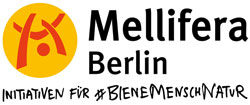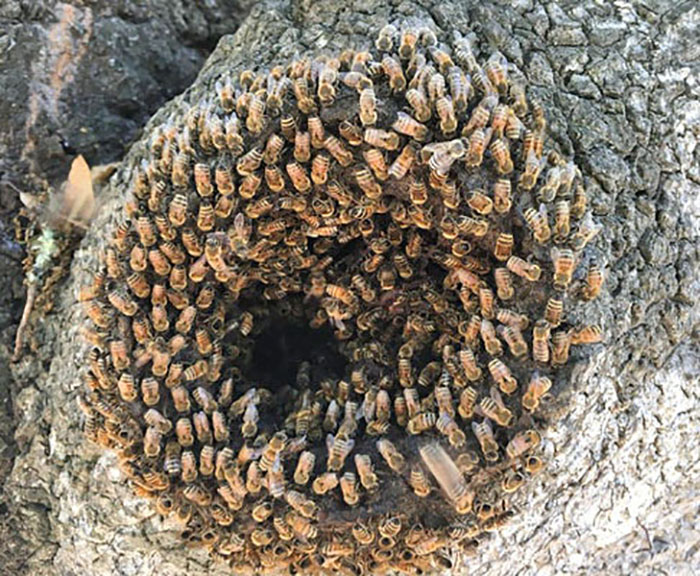- Deutsch siehe unten —
Video recording of the event see below
Experts from apiculture, conservation, forestry, and art convene to discuss the most pressing issue of our time: the Climate Crisis
Honey Bees & Hope in the Anthropocene convenes a group of multidisciplinary experts from a variety of fields — apiculture, conservation, forestry, art — to reflect upon the most pressing issue of our time, the Climate Crisis, and explore new synergies and multiple ways of being and knowing.
Honey bees, and in particular arboreal apiculture (aka tree beekeeping), have been chosen as a source of inspiration, for they peacefully and symbolically represent the interdependence and inter-being of innumerable life forms.
While the Anthropocene upends societal, ecological, economic, and spiritual systems all around us, we simultaneously find ourselves encountering opportunities for deep introspection and visionary innovation. Leading this charge and paving many promising new pathways for conservation, education, and inspiration, our panelists will share their stories, further pushing the boundaries of current narratives and hopefully inspiring attendees to think and act outside of the box.
10.10.2021 – 4–6pm
Online Round Table
PROGRAM
3:55pm entry in Zoom
4–5pm Panelists’ individual presentations
5–6pm Panel discussion + audience Q&A
DETAILS
Program will be conducted in English
For Zoom attendance, the link will be sent upon registration
Suggested donation of 5€-50€
Register via eventbrite
PANELISTS
Christoph Heinrich is the Chief Conservation Officer of WWF Deutschland and a member of WWF’s Executive Board. He is responsible for WWF’s nature conservation work to preserve biological diversity. The focus is on the protection of endangered habitats and species in international priority regions of the tropics and temperate latitudes, as well as in Germany. As a member of numerous nature conservation organizations and as a studied geographer, he has been active in nature conservation on a voluntary basis since his youth. || www.wwf.de
Ana Prvački’s training and background in music, theatre, mask work, architecture, fine art, and beekeeping inform a cross-disciplinary practice that ranges from watercolor to video, performance, and augmented reality. “I commit to making my work as round as the earth and my performances as compressed as water. I aim for pedagogical meme pollination and maximum viewer titillation.” She comes from a line of Slavic beekeepers. || www.anaprvacki.com
Heinz Risse is a tree beekeeper, co-founder of Mellifera Regionalgruppe Berlin, and founding board member of Tree Beekeeping International. He teaches beginners in organic, bee-centric, natural beekeeping; tree beekeeping; as well as traditional tree-climbing techniques. He is the Mellifera e.V. regional group leader in Berlin and co-producer of the Learning from the Bees | Berlin 2019 conference. || www.mellifera-berlin.de
Michael Joshin Thiele’s pioneering approach to apiculture as a platform for global renewal has appeared in national and international magazines, books, and films. He has presented his work at Harvard University, New York University, and consulted for the US Dept. of Agriculture (USDA). In 2006 he founded Gaia Bees to advance biodynamic practices in apiculture, then in 2017 created Apis Arborea, a multidisciplinary approach towards rewilding, conservation, and protection of honey bees. Michael pursues apiculture within a socio-cultural and spiritual dimension, and is an edge-walker within the biodynamic and holistic apicultural field. || www.apisarborea.org
Honey Bees & Hope in the Anthropocene is a collaboration between The Ambeessadors, Apis Arborea, and Mellifera Berlin.
Video Recording
On behalf of Michael, Heinz, Silke, and myself, thank you for attending and supporting the “Honey Bees & Hope in the Anthropocene” roundtable on Sunday, 10 October.
We heard from our esteemed panelists about their projects related to bees, conservation, and seeding hope, and encourage you to take their words to heart and spread your own acts of optimism and inspiration.
For those of you who could not join us live — and those who did and wish to view the event again — here is the link to the video recording on YouTube.
We hope to see you again soon.
Steve, Michael, Heinz & Silke
- — - — - — - — - — - — - — - — - — - — - —
Experten aus Imkerei, Naturschutz, Forstwirtschaft und Kunst diskutieren über das drängendste Problem unserer Zeit: die Klimakrise
Honey Bees & Hope in the Anthropocene (Honigbienen und Hoffnung im Anthropozän) versammelt eine Gruppe multidisziplinärer Experten aus verschiedenen Bereichen — Imkerei, Naturschutz, Forstwirtschaft und Kunst -, um über das drängendste Problem unserer Zeit, die Klimakrise, nachzudenken und neue Synergien und vielfältige Möglichkeiten des Seins und Wissens zu erkunden.
Honigbienen und insbesondere die Baumimkerei wurden als Inspirationsquelle gewählt, da sie friedlich und symbolisch für die gegenseitige Abhängigkeit und das Zusammenleben unzähliger Lebensformen stehen.
Während das Anthropozän die gesellschaftlichen, ökologischen, wirtschaftlichen und spirituellen Systeme um uns herum umkrempelt, bieten sich uns gleichzeitig Möglichkeiten für eine tiefgreifende Selbstreflexion und visionäre Innovationen. Unsere Podiumsteilnehmer, die in dieser Hinsicht führend sind und viele vielversprechende neue Wege für Naturschutz, Bildung und Inspiration ebnen, werden ihre Geschichten erzählen, die Grenzen aktueller Erzählungen weiter verschieben und die Teilnehmer hoffentlich dazu inspirieren, über den Tellerrand zu schauen und zu handeln.
10.10.2021 – 16–18 Uhr
Online Runder Tisch
PROGRAMM
15:55 Uhr Eintritt in Zoom
16–17 Uhr Individuelle Präsentationen der Podiumsteilnehmer
17–18 Uhr Podiumsdiskussion + Fragen und Antworten des Publikums
DETAILS
Das Programm wird in englischer Sprache durchgeführt
Für die Zoom-Teilnahme wird der Link bei der Anmeldung zugesandt
Empfohlene Spende von 5€-50€
Anmeldung über eventbrite
REFERENTEN
Christoph Heinrich ist Naturschutzbeauftragter des WWF Deutschland und Mitglied des WWF-Vorstandes. Er ist verantwortlich für die Naturschutzarbeit des WWF zum Erhalt der biologischen Vielfalt. Im Mittelpunkt steht dabei der Schutz gefährdeter Lebensräume und Arten in internationalen Schwerpunktregionen der Tropen und gemäßigten Breiten sowie in Deutschland. Als Mitglied zahlreicher Naturschutzorganisationen und als studierter Geograph ist er seit seiner Jugend ehrenamtlich im Naturschutz tätig. || www.wwf.de
Ana Prvački Ausbildung und Hintergrund in den Bereichen Musik, Theater, Maskenarbeit, Architektur, bildende Kunst und Bienenzucht bilden die Grundlage für eine interdisziplinäre Praxis, die von Aquarell bis hin zu Video, Performance und Augmented Reality reicht. “Ich verpflichte mich, meine Arbeit so rund wie die Erde und meine Performances so komprimiert wie Wasser zu gestalten. Ich strebe nach pädagogischer Meme-Bestäubung und maximaler Erregung der Zuschauer. Sie stammt aus einer slawischen Imkerfamilie. || www.anaprvacki.com
Heinz Risse ist Baumimker, Mitbegründer der Mellifera Regionalgruppe Berlin und Gründungsmitglied von Tree Beekeeping International. Er unterrichtet Anfänger in biologischer, bienenzentrierter, natürlicher Imkerei, Baumimkerei sowie in traditionellen Baumklettertechniken. Er ist Regionalgruppenleiter von Mellifera e.V. in Berlin und Mitorganisator der Konferenz Learning from the Bees | Berlin 2019. || www.mellifera-berlin.de
Michael Joshin Thiele bahnbrechender Ansatz zur Imkerei als Plattform für globale Erneuerung wurde in nationalen und internationalen Zeitschriften, Büchern und Filmen veröffentlicht. Er hat seine Arbeit an der Harvard University und der New York University vorgestellt und war als Berater für die Landwirtschaftsministerium der Vereinigten Staaten (USDA) tätig. Im Jahr 2006 gründete er Gaia Bees, um biodynamische Praktiken in der Imkerei voranzutreiben. 2017 rief er Apis Arborea ins Leben, einen multidisziplinären Ansatz zur Wiederansiedlung, Erhaltung und zum Schutz von Honigbienen. Michael verfolgt die Imkerei im Rahmen einer soziokulturellen und spirituellen Dimension und ist ein Vorreiter auf dem Gebiet der biodynamischen und ganzheitlichen Imkerei. || www.apisarborea.org
Honey Bees & Hope in the Anthropocene ist eine Zusammenarbeit zwischen The Ambeessadors, Apis Arborea und Mellifera Berlin.
Videoaufzeichnung
Im Namen von Michael, Heinz, Silke und mir danke ich Ihnen für Ihre Teilnahme und Unterstützung des Rundtischgesprächs “Honey Bees & Hope in the Anthropocene” am Sonntag, den 10. Oktober.
Wir haben von unseren geschätzten Podiumsteilnehmern über ihre Projekte im Zusammenhang mit Bienen, Naturschutz und der Aussaat von Hoffnung gehört und möchten Sie ermutigen, sich ihre Worte zu Herzen zu nehmen und Ihre eigenen Akte des Optimismus und der Inspiration zu verbreiten.
Für diejenigen unter Ihnen, die nicht live dabei sein konnten — und diejenigen, die es konnten und sich die Veranstaltung noch einmal ansehen möchten, hier ist der Link zur Videoaufzeichnung auf YouTube.
Wir hoffen, Sie bald wiederzusehen.
Steve, Michael, Heinz & Silke
Photo © Michael Thiele
Weiterführende Informationen
Glyphosate, the active ingredient in Roundup, is one of the most commonly used herbicides in the world by commercial gardeners. However, many pesticides — including insecticides, fungicides, and herbicides — harm pollinators and other beneficial insects.
To help educate those in the farming and gardening industries about this toxic chemical, we’ve created a comprehensive guide with organic, and homemade; and a second guide with agricultural alternatives. please take a look:
drugwatch.com/roundup/glyphosate/
drugwatch.com/roundup/alternatives/

